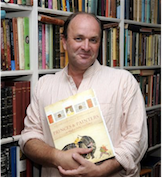 The Royal irish Academy hosted William Dalrymple to a sell-out crowd anxious to hear tales of the 1839 retreat from Kabul. Seriously, standing room only and rapt attention! The author is a superb story teller and this is more the subject of this quick post, but tangentially, I have to remark on the tremendous interest. I gather that Dalrymple was on Pat Kenny earlier in the day (and probably attracted some interest), but the fact is, this discourse was over subscribed weeks ago. Do the Irish appreciate a good story? Do they feel a real kindred interest in Afghani spirit as Dr Eunan O’Halpin asserted in his response to the address? Nonetheless, great to see the public interest.
The Royal irish Academy hosted William Dalrymple to a sell-out crowd anxious to hear tales of the 1839 retreat from Kabul. Seriously, standing room only and rapt attention! The author is a superb story teller and this is more the subject of this quick post, but tangentially, I have to remark on the tremendous interest. I gather that Dalrymple was on Pat Kenny earlier in the day (and probably attracted some interest), but the fact is, this discourse was over subscribed weeks ago. Do the Irish appreciate a good story? Do they feel a real kindred interest in Afghani spirit as Dr Eunan O’Halpin asserted in his response to the address? Nonetheless, great to see the public interest.
William Dalrymple has given us many great stories and masterful pieces of writing, From the Holy Mountain, The Last Mughal, to name but a few. His latest offering is the Return of a King – offering new perspectives on the First Afghan War using non-Western accounts. He is one of the foremost travel writers in the world today and brilliantly reaffirms the role and attraction of this genre in our collective culture. The attendance at the Academy event is testimony to this, as well as well as reaffirming continued fascination with Afghanistan as a place of intrigue and exotic culture irrespective of continual western intervention in the place. Return of a King recounts the folly, colourful personalities, tragic events of the First Anglo-Afghan War and places western involvement in a valuable new perspective by drawing on Afghan sources. It is colourfully told and skilfully interwoven with the author’s personal experiences as he compiled background material and traveled in the area. The book is clever, smooth and a great read. Moreover, as I repeat, it continues to demonstrate the continuing demand for this genre. However, and this is what intrigues me, how is the genre evolving in respect of the more mobile society that we live in, the evolution of where we look for this sort of tale (online) or whether we put together our own synthetic experience through the information at our fingertips?
I have always enjoyed travel writing and often find myself placing it into a late Victorian timeframe even as I read in modern day. It falls into the same scheme of wonderment as a Karl Baedeker Guide (the DK travel guides possibly being modern successors) as a vicarious trip in the mind. This where I started to reflect on Dalrymple’s tales. I don’t doubt that he made the journeys, nor do I doubt that he met the personages he refers to, but I do wonder about how one becomes self-reflective in the writing. I have a sense that Dalrymple is a man out of his time and perhaps it what leads me to wonder about the content and style of his writing. It is very good, don’t get me wrong, but the attributed quotes to modern day travel companions and notables are strangely well-phrased and profound. One is given pause to consider whether on the spur of the moment someone actually is able to throw off these profundities and although some undoubtedly can…does everyone? It’s a small quibble really, but it raises the question as we attenpt to place the travelogue into a different time where we may not have questioned these things. I really love being along for the trip, getting the privilege of sharing his encounters and all the more so with the tremendous contextualising that goes along with it. But I wonder what the future is for the traditional travelogue as we are increasingly influenced by a greater profusion of sources of info making us critical if not cynical. I think I am battling with a golden age vision of this genre and William Dalrymple’s well crafted traditional piece has caused me to ponder.
